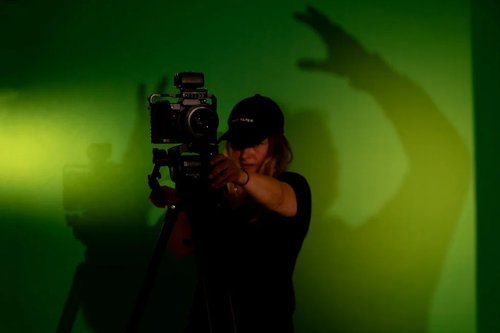The inside scoop: Leveraging informational interviews for career success
Nov 13, 2023
6 mins


Freelance journalist and writer
Navigating the path to reach a fitting career can often feel like a daunting and tiring process. This can be for many reasons—perhaps the industry you’re interested in seems difficult to get into without needed connections, or a job that looks appealing on the surface ends up being very different in its day-to-day than what you imagined, or maybe the realities of the pay and lifestyle don’t correspond with what you wish for. The solution to this may lay in informational interviews.
More than just “career-focused conversations”, informational interviews can indeed give you a unique insight into what you might expect from the job while equipping you with useful network contacts. Nicole Precourt, career and educational counselor and founder of Waves of Career Change, shares her expert insights on how to best leverage the power of informational interviews to render your job-hunting journey more fruitful and your career more fulfilling.
Informational Interviews 101
When you hear the word “interview”, especially in the job searching realm, you probably think about a conversation between an employer or a recruiter and a candidate. This is not the case with an informational interview, however. Here it’s you—the job hunter—who asks questions to an employee working on something you’re interested in pursuing as a career or at a company you’d like to apply to.
An informational interview can serve job seekers as a unique, more casual opportunity to connect with relevant people to find out more about a certain role, industry, sector, or company and get a realistic insight into whether it would potentially be a good fit for them. “It’s about reaching out and connecting with someone to learn more about how and why they got into their field and about their job,” explains Precourt. “It can entail learning more about what ‘a day in the life’ is like in a certain role or as I like to call it, the good, the bad, and the ugly!”
Informational interviews are a concept more popular and more present in our lives than we might think. Most of the time, they’re not structured, rigid, or uptight questionings—rather a natural, organic conversation driven by interest and the will to create meaningful connections. “Many people conduct informational interviews and don’t even realize it,” says Precourt. “For example, if you’re at the dentist and considering becoming a dental assistant, hygienist, or dentist … if you ask them questions about their job or their path, that is also considered an informational interview.”
The endless benefits of informational interviews
The strong suit of informational interviews is that they can give you a much better understanding of what it’s like to work in a specific role or be part of a particular sector or a company than any type of deep online research or cold networking. So, just as you can imagine, the benefits of conducting informational interviews as part of a job search are versatile—or as Precourt says: “They are endless! An informational interview is a real glimpse into what it would be like to work at a certain job or in a certain industry—and if you’re able to physically go to the place of work for the person that you’re interviewing and see them perform their day-to-day tasks, it’s even more beneficial.”
Thanks to informational interviews, especially well-prepared ones, you might be able to:
- Quickly deduct which steps you need to take to get the role you want
- Assess what are the the pros and cons of the daily reality of the role
- See how you fit into the environment of the company you’re interested in
- Find out about the relationships between colleagues and managers
- Decide whether you align with the values of the industry
- and much more!
The bottom line is that no informational interview is ever a waste of time. “Even if this role, company, or sector does not resonate with you as you thought it would, you shouldn’t get discouraged. Part of knowing what you want to do is what you don’t want to do!”
Preparation is key
Though informational interviews tend to be rather casual, organic, and simple, what you do before even setting one up is as important, if not more, as the informational interview itself. “It all starts with taking a step back and thinking about who you want to talk to, what you want to know, and what you want to get out of the experience,” says Precourt.
When it comes to finding the right person to speak with, there are many ways in which you can reach out, from approaching a friend to creatively networking online. “LinkedIn is always a good way to start if you’re interested in finding out about a particular role. But if you’re looking into a certain sector or industry, googling a local business in your area can be a great solution, as they might be more approachable and keen to help you,” Precourt explains.
“For companies, try looking on their website for their staff and contact information. From there, if they list individual email addresses, it’s always better to send a personalized email as opposed to a generic one.” And remember: “Try a variety of methods until you’re able to connect with your chosen person as different people prefer different means of contact. And if someone shares a connection with you, they will most likely give a recommendation as to the best way to reach out.”
In terms of the interview itself, Precourt recommends preparing a list of crafted, tailored, and open questions in advance, which we’ll discuss more in-depth in the next section. To get the most out of your informational interview, you should remember to get yourself in the right mood and present yourself well. “Be present, professional, and positive,” says Precourt. “Listen to what the person you’re interviewing has to say and respect their time. This is your first impression, and you don’t want to leave this informational interview on a negative note.” \
The TIARA approach to crafting effective questions
Although there are many ways in which you can approach an informational interview, the most popular technique to craft effective and useful questions is that of Steve Dalton’s book “The 2-Hour Job Search” called the TIARA Framework. TIARA, an acronym for Trends, Insights, Advice, Resources, and Assignments, provides a structured approach for your informational interview. You start by exploring the bigger picture of the profession the interviewee is in, then gradually shift towards more personalized questions. This way, you get a much wider perspective on a role or sector you’re interested in—and increase the likelihood of establishing a meaningful connection.
When you get to the interview, Precourt recommends starting your conversation by engaging with the interviewee on a more personal level. Ask how they’re doing and about their educational and professional journey to get to where they are now. Then, following the TIARA method, ask the following questions:
T (Trends): Get a grasp of the industry and its recent developments
- What recent trends in the market have had the biggest impact on your field and your role?
- Since you began, what have been the most significant changes you’ve observed in the industry?
- What do you foresee as the most substantial changes in your business or field in the coming years?
I (Insights): Find out about your interviewee’s personal view on the role and the sector
- Why did you pick this job/career field in particular? Has it met your expectations?
- What is the best and worst thing about your job/this industry?
- Does your job provide you with a good work-life balance and adequate salary?
A (Advice): Ask any advice that could apply to your particular situation
- Which college major would you say is the most relevant to enter this field?
- What are the skills you need to have for this job?
- What could I be doing right now to prepare myself for a career in this field?
R (Resources): Explore any additional resources you could reach for
- Would you recommend getting a certain type of additional training or certification/licensure for this job?
- Are there any books you recommend I read to find out more about your job and field?
A (Assignments): End by getting to know the interviewee’s workload and objectives
- What is your favorite part of your day-to-day tasks?
- Could you share a project or projects that you believe brought significant value?
- Have any projects gained notable traction within your organization lately?
Naturally, you can adapt the framework and its sections to your preference and to the flow of the conversation. Remember: your informational interview should be relaxed and casual, so aim to make the interview your own.
The post-interview networking leverage
You might be done with your informational interview, but your job isn’t done yet! The post-interview stage is crucial, as this is when you reflect on everything you just learned and actively work on maintaining the professional connections you just created.
“The key to succeeding in your informational interview is fostering your new connection,” says Precourt. “The perk of having an actual conversation with this person, whether on the phone, a video meeting, or in-person, is [that] you’re able to connect on a more personal level than if you just send an email.”
Even before you leave the interview, ask to connect with them on LinkedIn, to give a good start to a natural way of keeping up to date with each other. As for LinkedIn, Precourt emphasizes that you should try leveraging all of its features. “After adding your new contact, the platform will naturally make suggestions for additional connections that they have, which can be very beneficial for creating a wider network in your targeted field.”
Once successful in connecting with your interviewee, Precourt suggests following up shortly. “You can ask for another meeting in the future or send them some follow-up questions after you reflect on your experience.” Remember to be proactive and keen with your new connection, as you never know how useful it can be for you. “If you make a good impression during the interview and manage to keep it up after, you might even be suggested for a potential recruitment or recommended to another actor in the field.”
After all, what’s a better indication of one’s motivation to perform a given role or contribute to a particular company, than following their sheer interest and setting up a space to try to find out about it as much as possible even before they apply?
Photo: Welcome to the Jungle
Follow Welcome to the Jungle on Facebook, LinkedIn, and Instagram, and subscribe to our newsletter to get our latest articles every week!

More inspiration: Network for the job hunt

Messaging recruiters: 7 mistakes to avoid on LinkedIn
Think messaging a recruiter on LinkedIn guarantees an interview? Not if you make these mistakes. Here's how to get noticed for the right reasons.
Dec 02, 2024

From tech to television: the benefits of alumni networking
Using your alumni network can be a game-changer for your career, allowing you to connect with people who share your background and experiences.
Jul 30, 2024

How to network in tech with no experience
Networking can be daunting for anyone, but entry-level tech workers have a unique challenge ahead.
May 30, 2024

Make your mark: How to build a personal brand for the job hunt
What’s the secret to success in today’s job market? None other than personal branding.
Apr 22, 2024

Telling your story: How to craft a LinkedIn bio that will stand out to recruiters
This social media tool is at the tip of your fingers, and we bet you don’t know what you’re missing …
Feb 13, 2024
The newsletter that does the job
Want to keep up with the latest articles? Twice a week you can receive stories, jobs, and tips in your inbox.

Looking for your next job?
Over 200,000 people have found a job with Welcome to the Jungle.
Explore jobs